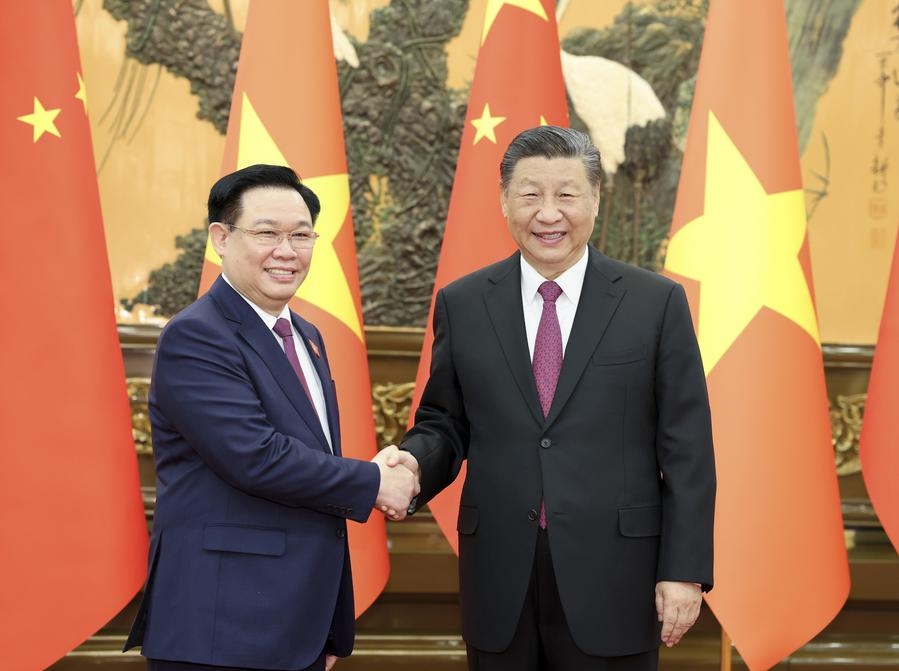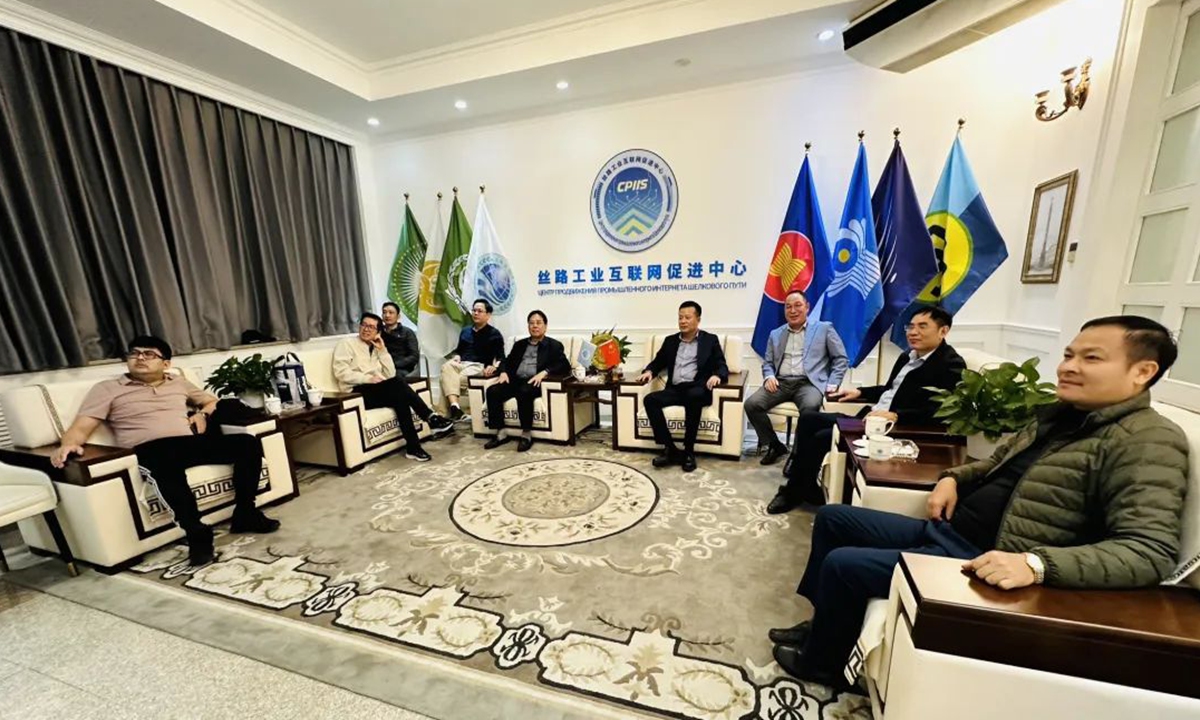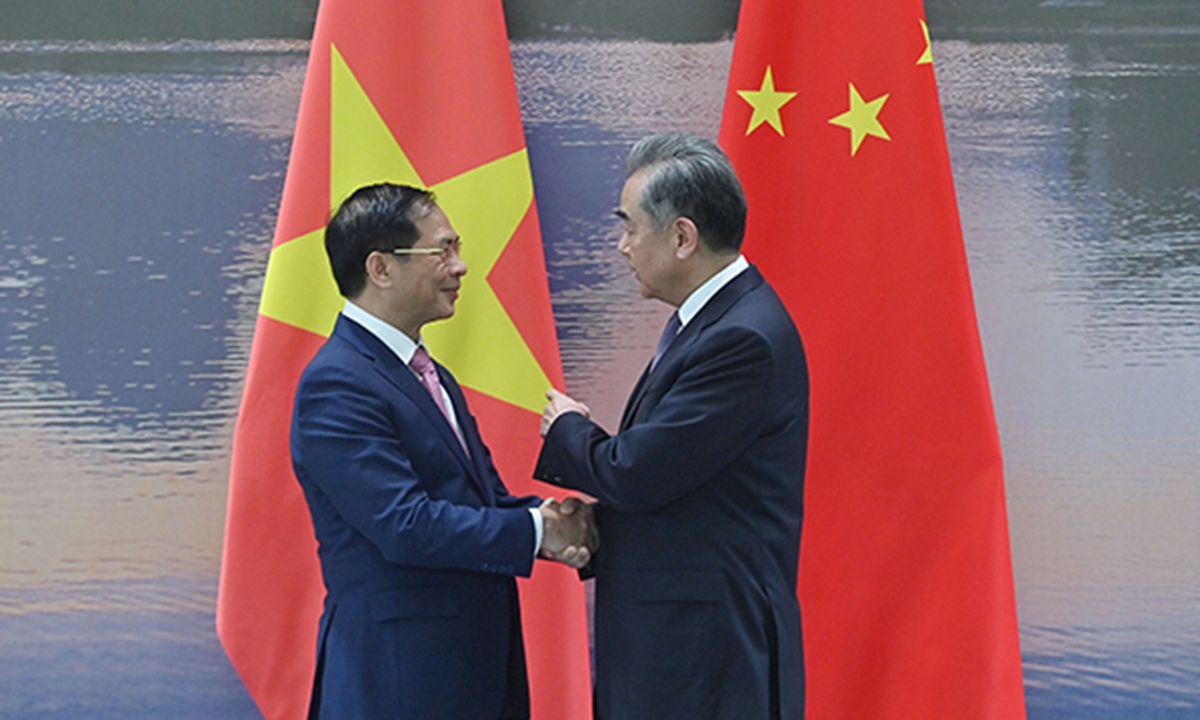Xi calls China-Vietnam ties 'comrades-plus-brothers' when meeting visiting Vietnam top legislator
Hue’s trip vital for promoting bilateral relations, stabilizing SCS tensions: experts

Chinese President Xi Jinping meets with Chairman of the National Assembly of Vietnam Vuong Dinh Hue at the Great Hall of the People in Beijing, capital of China, April 8, 2024. Photo: Xinhua
The visit by the Vietnamese top legislator and his high-ranking delegation is vital for scaling up the cooperation between the two countries, two legislatures, two parties and two peoples, as well as regional cooperation between China and ASEAN, Chinese experts believe, who also have high expectations of the two sides' joint efforts for a stable and peaceful South China Sea.
Chinese President Xi Jinping on Monday met with Chairman of the National Assembly of Vietnam Vuong Dinh Hue in Beijing, according to the Xinhua News Agency.
At the invitation of Zhao Leji, chairman of the National People's Congress Standing Committee, Hue is in China for a six-day official visit beginning on Sunday, media reported. The head of the assembly is officially among the four "pillars" of the leadership in Vietnam, which has no paramount ruler, Reuters reported, noting that the pillars also include the party chief, the president and the prime minister.
While asking Vuong Dinh Hue to convey his cordial greetings to Nguyen Phu Trong, General Secretary of the Communist Party of Vietnam (CPV) Central Committee, Xi also said that during his visit to Vietnam at the end of last year, he and Nguyen Phu Trong jointly announced the building of a China-Vietnam community with a shared future that carries strategic significance, opening a new chapter in bilateral ties.
Xi said the most distinctive feature of China-Vietnam relations is that the two sides are a like-minded pair bound by a common destiny, and "comrades-plus-brothers" is the most vivid description of the traditional friendship between the Chinese and Vietnamese parties and countries.
He urged joint efforts by the two sides to promote more achievements in building a China-Vietnam community with a shared future, better serve their respective modernization, further benefit the two peoples and make greater contributions to the global socialist cause.
China is willing to scale up the exchange of experience gained in governing both the Party and the country, facilitate the synergy between the Belt and Road Initiative and the Two Corridors and One Economic Circle strategy, and increase exchanges between young people and sister cities, among others, Xinhua reported.
According to multiple Vietnamese media outlets, accompanying the top Vietnamese legislator are Secretary of the Party Central Committee and head of the committee's Mass Mobilisation Commission Bui Thi Minh Hoai, Senior Lieutenant General Tran Quang Phuong, NA Vice Chairman and Chairman of the Vietnam-China Friendship Parliamentarians' Group, Deputy Prime Minister Tran Luu Quang, NA General Secretary and Chairman of the NA Office Bui Van Cuong, among other officials.
This is a high-ranking and large-scale delegation with officials from the Vietnamese central government, legislature and the party, which highlighted the profound and extensive significance of the visit, Gu Xiaosong, dean of the ASEAN Research Institute of Hainan Tropical Ocean University, told the Global Times on Monday. "Such a high-level and large-scale visit, which is set to last for about one week, is rare," Gu noted.
Vietnam News Agency (VNA) reported on Sunday that this is the first visit to China by Hue in his capacity as NA Chairman, and also the first by a top Vietnamese legislator in five years.
China and Vietnam have many common points and broad areas for cooperation, Gu said. Economically, China has long been Vietnam's largest trading partner, with two-way trade consistently exceeding $100 billion since 2018, VNA reported. Politically, both countries are socialist states, and culturally they share many similarities.
Through the visit, in addition to cooperation on economics, trade and investment, high-level strategic exchanges between the two parties and two legislative bodies as well as exchanges on international and regional issues of common concern are expected to be promoted, experts stressed.
Recently, South China Sea tensions fanned by the Philippines have been hot-button issues as Manila has made frequent provocations in the region and even joined forces with countries outside the waters including the US, Japan and Australia to stir up trouble, Gu pointed out.
In this context, both China and Vietnam, as neighbors in the South China Sea, are working hard to maintain peace and stability in the region. The visit by the Vietnamese top legislator to China is expected to help both sides further manage their differences, promote security cooperation, and jointly maintain stability in the South China Sea, Gu believes.
"This stands in stark contrast to the Philippines introducing external forces to stir up tensions in the region and disrupt peace and stability," the expert said.
April has witnessed a host of high-level visits from Southeast Asian countries to China. Chinese Foreign Ministry spokesperson Mao Ning said on Monday at a regular press briefing that many leaders and foreign ministers from several Southeast Asian countries have visited China over the past few days, which demonstrates the great importance relevant countries attach to their relations with China.
She stated that neighboring countries are China's priority in its diplomacy. China and Southeast Asian countries are good neighbors, good friends and good partners with a shared future.


